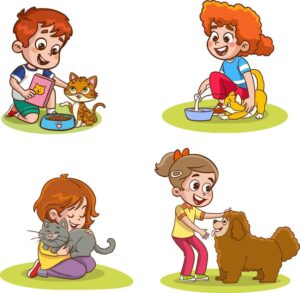Money and Values: Teaching Kids About Charity and Giving Back
We can all agree that teaching kids about charity is one priority for most parents. We all want our children to grow up to be compassionate, socially-conscious citizens who care about making the world a better place. One of the most impactful ways to nurture these qualities in kids is to teach them the importance of charity, philanthropy and giving back from an early age. Giving back not only helps those in need, but also helps children develop empathy, perspective, responsibility and leadership skills that will serve them well throughout life.
In this blog post, we’ll provide tips on how to have meaningful conversations with your children about charity and explore fun, engaging ways for families to give back together. From volunteering at food banks to fundraising efforts right at home, read on for guidance on raising generous, community-oriented kids.
Why Teaching Kids to Give Back Matters

Instilling the values of generosity and teaching kids about charity and selflessness from a young age can have an enormously positive impact that lasts a lifetime. Volunteering and giving back provide children with an invaluable opportunity to develop empathy, responsibility, leadership skills, and a sense of community connection.
Volunteering and charity instil children with values and skills needed to succeed, such as:
Develops Empathy and Perspective
The first step to teaching kids about charity is exposing them to the reality that not everyone is as fortunate as they are is a profound way to build empathy and perspective. Seeing first-hand what life is like for people facing poverty, adversity, and hardship helps kids gain insight into the very real challenges others encounter and appreciate just how lucky they are in their own lives. Learning about people whose day-to-day experiences are vastly different from their own also fosters understanding, compassion, and acceptance of individual differences and unique life stories.
Inspires Responsibility and Leadership
The act of giving back invokes a sense of social responsibility in children by demonstrating the powerful impact that one person or action can have on others. It teaches kids that even at a young age, we all have a duty to help and care for people in our community when we have the capacity to do so. Taking the initiative to start a fundraiser, volunteer with an organization, or gather donations for a cause also builds valuable leadership skills as children learn how to turn an idea into action.
Promotes Family and Community Connection
Volunteering together as a family fosters tighter family bonds and gives parents and children a shared purpose. Serving others also provides opportunities for kids to engage with community members they may not normally interact with, building connections and relationships with people from all walks of life. Seeing familiar faces when volunteering locally over time further cultivates this sense of community and belonging.
Kid-Friendly Charitable Causes

Getting kids excited about giving back is all about finding causes that resonate with their unique interests and strengths. Great charitable options to explore with children include:
Alleviating Local Poverty
Local poverty-alleviation causes help kids recognize need within their own communities. Consider volunteering as a family at community food banks or soup kitchens that provide meals to those facing food insecurity and hunger. Kids can assist with preparing or serving food, packing grocery bags, or keeping little ones entertained in the play area. Organizing supply drives with your child’s school or youth group to gather canned goods, toiletries, blankets and other essentials that homeless and domestic violence shelters desperately need is another impactful way kids can help struggling neighbours.
Environmental Protection
Environmental conservation taps into children’s natural curiosity about the world around them and offers hands-on volunteering activities. Participating in community park, beach or street clean-ups helps kids take pride in beautifying shared public spaces while learning about sustainability. Teaching kids about charity and connecting them with reputable wildlife protection groups like the Wildlife Trusts or WWF provides opportunities to fundraise at school on behalf of endangered species or fragile ecosystems, putting their love of animals into meaningful action. Consider an eco-volunteering family vacation to help conserve natural habitats hands-on if your child is especially passionate about our planet!
Animal Welfare

Many kids feel a special bond with animals, making animal welfare an appealing avenue for charity. Gather gently used pet supplies like food bowls, leashes and beds to donate to local animal shelters seeking to make rescued pets comfortable while awaiting adoption. Kids can also help shelters directly by making enrichment toys for cats or walking and playing with dogs to improve physical and behavioural health. Getting involved with adoption fairs, humane society fundraisers and other animal charity events teaches kids the costs associated with helping our furry friends, while allowing them to apply creativity to support the cause.
Supporting Healthcare Facilities
Hospitals and care facilities can feel cold and intimidating for sick kids and families going through medical challenges. That’s why charitable projects to brighten hospital stays resonate strongly with children – they can relate to wanting comfort when ill or hurt. Have kids decorate cards with messages of hope to gift children in paediatric wings or undergoing treatment. Donating new books, toys and games to waiting room play areas also eases stress of hospital visits for young patients and siblings. Getting kids involved with non-profit hospital fundraising galas later in their teens further exposes them to health charities assisting with research, facilities, specialized equipment and patient support services.
The key to teaching kids about charity is finding connections between your child’s personal interests and passions and broader community needs, to illuminate how sharing their gifts impacts others for the better. Over time this builds an innate spirit of generosity, citizenship and purpose.
Looking for how to turn everyday moments into fun financial lessons for your children? See our blog here!
Fun Strategies to Teaching Kids about Charity
Use these engaging ideas to teach kids generosity while creating meaningful family moments:
Lead by Example
- Model compassion by volunteering as a family. Serve meals together or participate in charity walks, races and events.
- Let kids see you donating time and resources to causes. This organic example is more valuable than any lecture on generosity.
Use Allowance for Sharing
- Have children set aside part of their allowance to donate to a charity. Guide them in choosing an organization to regularly support.
- Match their contributions to amplify impact. This builds a mindset of routine giving from an early age.
DIY Creative Fundraisers

- Bake sale for charity – Kids love to get messy in the kitchen when it’s for a good cause! Bake sweet treats then set up a stand in your neighbourhood.
- Used book sale – Everyone wins with this classic fundraiser. Kids tidy up their shelves, you declutter, and proceeds go to organizations in need.
- Art sale – Get creative together by making artwork and crafts to auction off or sell, donating funds raised.
To kickstart your kid’s entrepreneurial journey, check out our Young Entrepreneur Bundle here.
Volunteer as a Family
- Serve at a soup kitchen/food bank to support hungry families who can’t afford regular meals. Working the serving line delivers an impactful lesson for kids.
- Help at an animal shelter by walking dogs, grooming cats or cleaning cages. Caring for rescue pets connects kids to the cause.
- Join park and beach clean-up days through community groups. Picking up litter tackles pollution while enjoying fresh air and sunshine!
Be sure to discuss each experience afterward to reinforce lessons learned.
Make Special Occasions About Giving
Transform birthdays, holidays and more into opportunities for generosity:
- In lieu of gifts for their own birthday, have kids request donations to a meaningful charity. Show them how gathering many small gifts creates a big impact.
- Help them select gifts for toy and book drives leading up to Christmas. This teaches thoughtfulness about what others may need.
- For family vacations, incorporate a morning volunteering activity while traveling. Serve at a soup kitchen/food bank or help build houses to aid communities in need.
Keep Little Ones Engaged with Kindness Projects
Even very young kids can understand and participate in age-appropriate goodwill projects:
- Work together to make homemade cards with uplifting messages to give to seniors or hospital patients.
- As a family, regularly go through toys to donate items in good condition that they’ve outgrown. Explain gently how this allows less fortunate children to enjoy the toys too.
- Let them help you gather pantry items or pick out a few of their own toys for donation drives. Making them a part of the process builds routine giving.
Charities Making an Impact

Beyond hyperlocal efforts, connect your children to larger charities tackling meaningful issues. Some top family-friendly organisations include:
- Supports children globally by protecting rights, providing supplies, medicine, food and water.
- Kid-centric focus on issues like disease, hunger and lack of education access resonates.
- Leading children’s charity dedicated to ending abuse and neglect.
- Provides resources for parents while making communities safer for kids.
- International organization assisting children in impoverished conditions and conflict zones.
- Empowers kids to learn, be safe, healthy and cared for.
- Grants wishes to enrich lives of children fighting critical illnesses.
- Heart-warming way for kids to see peers benefiting from generosity.
From Oxfam to Great Ormond Street Hospital and more, explore charity options together to find meaningful matches.
Instilling Generosity and Compassion from a Young Age
While finances drive many family conversations, teaching children to give rather than get cultivates purpose and selflessness. Volunteerism, charity and kindness projects make a resounding impact in developing little ones into engaged community members.
Use the guidance in this post to have meaningful dialogues about need in the world while creating cherished memories through service. Foster generosity from toddlerhood into the teen years by trying family-based ideas that resonate at every child’s unique stage.
Most importantly, lead with your actions. Children notice and replicate when mum and dad walk the talk. With compassion and consistency, raising caring, philanthropic kids is within reach!
So How Can Finabee Help?
Here at Finabee we believe that all children should have access to financial and entrepreneurial education to inspire and build good money habits from an early age. Read a bit more about us here and how we plan to raise a generation of finance-savvy children for the future.
You can signup to the waiting list here for our app too to be one of the first to use it and be in with a chance of winning a £50 voucher!
Now that’s a savvy investment!

Have you taught any of these financial lessons to your children recently? How did your children respond to them? Please brag about your successes in the comments below and help others in The Hive community!





